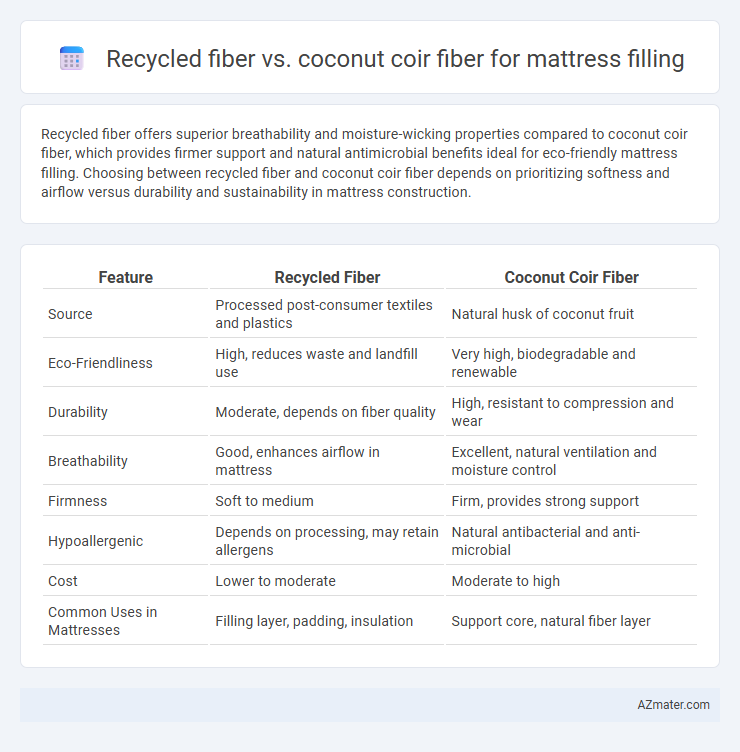Recycled fiber offers superior breathability and moisture-wicking properties compared to coconut coir fiber, which provides firmer support and natural antimicrobial benefits ideal for eco-friendly mattress filling. Choosing between recycled fiber and coconut coir fiber depends on prioritizing softness and airflow versus durability and sustainability in mattress construction.
Table of Comparison
| Feature | Recycled Fiber | Coconut Coir Fiber |
|---|---|---|
| Source | Processed post-consumer textiles and plastics | Natural husk of coconut fruit |
| Eco-Friendliness | High, reduces waste and landfill use | Very high, biodegradable and renewable |
| Durability | Moderate, depends on fiber quality | High, resistant to compression and wear |
| Breathability | Good, enhances airflow in mattress | Excellent, natural ventilation and moisture control |
| Firmness | Soft to medium | Firm, provides strong support |
| Hypoallergenic | Depends on processing, may retain allergens | Natural antibacterial and anti-microbial |
| Cost | Lower to moderate | Moderate to high |
| Common Uses in Mattresses | Filling layer, padding, insulation | Support core, natural fiber layer |
Introduction: The Importance of Mattress Filling Materials
Mattress filling materials significantly impact sleep quality, comfort, and environmental sustainability, with recycled fiber and coconut coir fiber representing two popular eco-friendly options. Recycled fiber offers excellent breathability and cushioning by utilizing repurposed textile waste, reducing landfill burden and resource consumption. Coconut coir fiber provides natural durability, moisture-wicking properties, and strong support due to its coarse, fibrous structure derived from coconut husks, making it ideal for firm mattress cores.
Overview of Recycled Fiber as Mattress Filling
Recycled fiber used in mattress filling primarily consists of repurposed polyester, cotton, or foam materials, offering an eco-friendly alternative that reduces landfill waste and conserves natural resources. This fiber provides excellent breathability, durability, and resilience, enhancing mattress comfort and longevity while maintaining affordability. Compared to coconut coir fiber, recycled fiber excels in softness and flexibility, making it suitable for a wide range of mattress firmness levels and layering systems.
Overview of Coconut Coir Fiber as Mattress Filling
Coconut coir fiber is a natural, eco-friendly mattress filling derived from the husk of coconut shells, known for its durability and breathability compared to recycled fiber. It offers excellent moisture-wicking properties and provides firm support, enhancing mattress longevity and comfort. This sustainable material resists mold and dust mites, making it ideal for hypoallergenic bedding solutions.
Environmental Impact: Recycled Fiber vs Coconut Coir Fiber
Recycled fiber mattress filling significantly reduces landfill waste by repurposing materials like old textiles and plastic bottles, minimizing resource extraction and lowering carbon emissions during production. Coconut coir fiber, derived from coconut husks, is biodegradable and sustainably sourced but involves water-intensive processing and transportation emissions, especially if imported. Both materials offer eco-friendly alternatives, with recycled fibers excelling in waste reduction and coir fibers providing natural, compostable benefits, making their environmental impact context-dependent based on sourcing and processing methods.
Comfort and Support Comparison
Recycled fiber mattress filling offers a lightweight and breathable option that provides moderate support and cushioning, making it suitable for those seeking a balanced comfort level with eco-friendly benefits. Coconut coir fiber, derived from coconut husks, provides firmer support with excellent durability and natural moisture-wicking properties, ideal for individuals requiring robust spinal alignment and enhanced mattress longevity. The choice between recycled fiber and coconut coir fiber hinges on the preferred firmness level and support type, with coir fibers excelling in providing firm, supportive comfort while recycled fibers offer softer, more cushioned feel.
Durability and Longevity
Recycled fiber mattress fillings offer moderate durability but tend to compress and lose resilience over time due to their synthetic or blended composition. Coconut coir fiber, derived from natural coconut husks, provides superior longevity with strong resistance to wear, moisture, and deformation, maintaining firmness and support for years. The natural antimicrobial and moisture-wicking properties of coir fiber further enhance mattress durability compared to recycled fibers.
Allergens and Health Considerations
Recycled fiber mattress fillings often undergo chemical processing that can introduce allergens or irritants, potentially triggering respiratory issues or skin sensitivities in sensitive individuals. Coconut coir fiber is naturally hypoallergenic, resistant to dust mites, mold, and mildew, making it a healthier option for allergy sufferers and those prone to asthma. Its antimicrobial properties reduce the risk of bacterial growth, promoting a cleaner and safer sleeping environment.
Cost Analysis: Which Is More Affordable?
Recycled fiber offers a more affordable option for mattress filling due to lower raw material and processing costs compared to coconut coir fiber, which requires labor-intensive extraction and treatment. Coconut coir fiber's higher durability and natural resilience contribute to its premium pricing in the mattress market. Cost analysis reveals recycled fiber mattresses generally have lower production expenses, making them more budget-friendly for consumers seeking economical bedding solutions.
Sustainability and Eco-Friendliness
Recycled fiber mattress fillings significantly reduce landfill waste by repurposing post-consumer textiles and plastics, offering a sustainable alternative with a lower carbon footprint compared to virgin materials. Coconut coir fiber, derived from coconut husks, is biodegradable and naturally resistant to mold and dust mites, providing an eco-friendly and renewable resource that enhances mattress durability and breathability. Both materials promote sustainability, but coconut coir's natural origin and compostability make it particularly advantageous for environmentally conscious consumers seeking zero-waste bedding options.
Conclusion: Choosing the Best Fiber for Mattress Filling
Recycled fiber offers sustainability by repurposing waste materials, providing breathability and hypoallergenic benefits suitable for eco-conscious consumers. Coconut coir fiber excels in durability, natural moisture resistance, and firm support, making it ideal for those seeking a long-lasting, eco-friendly mattress with enhanced airflow. Selecting the best fiber depends on balancing environmental impact, comfort preferences, and desired mattress firmness, with recycled fiber favoring softness and coconut coir emphasizing natural resilience.

Infographic: Recycled fiber vs Coconut coir fiber for Mattress filling
 azmater.com
azmater.com